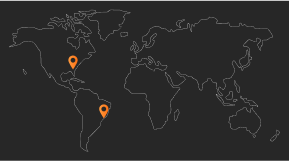Vertical AI: The Revolution of Specialized Artificial Intelligence

Artificial Intelligence (AI) has been advancing at an accelerated pace, transforming entire industries with its applications. However, as AI adoption expands, it becomes evident that general-purpose AI solutions are not sufficient to meet the complexities and specific demands of each industry.
This is where Vertical AI comes into play—a model that harnesses the power of AI to solve highly specialized problems, delivering precision, efficiency, and compliance with regulations.
What is Vertical AI?
Vertical AI refers to the development and application of artificial intelligence models designed exclusively to meet the demands of a specific sector or industry. Unlike Horizontal AI, which provides broadly applicable solutions, Vertical AI delves into the specific characteristics of a given domain, leveraging highly relevant data to enhance performance and decision-making.
This approach ensures greater reliability and alignment with the operational and strategic needs of businesses. In fields such as healthcare, finance, and manufacturing, AI specialization helps reduce risks, optimize processes, and create new opportunities for innovation.
As industries advance in their AI adoption, the trend is for generic solutions to be progressively replaced by vertical technologies, tailored to each specific context.
Vertical AI can be categorized based on its focus and application within a sector. Specialized models are developed to address highly specific challenges, such as automated interpretation of medical imaging in healthcare or demand forecasting in retail. Customized AI infrastructures provide technical and regulatory support for AI implementation in industries with strict compliance requirements, such as finance and law.
Additionally, Vertical AI plays a significant role in operational automation, optimizing workflows and reducing inefficiencies. Manufacturing companies, for example, use AI to predict equipment failures before they disrupt production. Meanwhile, in scientific research, advanced models accelerate discoveries in fields such as biotechnology and materials engineering, reinforcing AI as a fundamental pillar of innovation.
Industries That Have Adopted Vertical AI
The adoption of Vertical AI is growing as different industries recognize the value of specialization. In the medical sector, advanced algorithms analyze imaging exams with greater accuracy than traditional methods, enabling faster diagnoses and more effective treatments. AI models also assist in therapy personalization, adjusting treatment protocols based on each patient's history.
In the financial market, AI is used for fraud detection, investment optimization, and credit analysis. The specialization of these models ensures that decisions are made based on real market behavior patterns, reducing risks and improving strategies.
Retail and e-commerce use AI to personalize offers and predict consumption patterns, optimizing inventory and enhancing the customer experience. In the industry sector, Vertical AI plays a fundamental role in predictive maintenance, increasing the lifespan of equipment and reducing operational costs. In agribusiness, algorithms analyze weather and soil conditions to maximize productivity, contributing to the sustainability of production.
The Challenges of Adopting Vertical AI
Despite its evident benefits, the implementation of Vertical AI faces significant obstacles. The first challenge is the availability of high-quality data. Highly specialized models require large volumes of relevant information for training, and many industries still struggle to collect, store, and process this data efficiently.
Another critical factor is integration with legacy systems. Many companies operate with outdated infrastructures that were not designed to support AI, requiring adaptations that can be complex and costly. Additionally, regulations pose a hurdle, especially in highly regulated sectors such as healthcare and finance, where ensuring transparency and compliance with specific standards is essential.
The shortage of specialized professionals also limits the adoption of Vertical AI. Developing efficient models requires advanced technical expertise and a... (sentence incomplete – let me know if you’d like to continue it).
The Future of Vertical AI
The evolution of Vertical AI is unstoppable. As AI becomes central to the digital transformation of businesses, specialization emerges as the most effective strategy for ensuring superior performance and compliance with industry-specific requirements.
Reports indicate that in the coming years, most companies implementing AI will prioritize vertical solutions, seeking models that align closely with their operational and strategic needs.
In Brazil, the adoption of Vertical AI still faces challenges related to infrastructure and workforce development, but the trend is gaining momentum. The number of startups and companies developing specialized solutions is increasing annually, and this movement is expected to accelerate as more industries recognize the value of AI specialization.
Conclusion
Artificial Intelligence is no longer a futuristic concept—it has become an indispensable tool for businesses seeking efficiency and innovation. However, the era of generic AI solutions is giving way to a more refined approach, where AI is tailored to meet the unique needs of each industry.
Vertical AI is not just a trend—it is a logical and necessary step in the evolution of AI. Specialization brings precision, efficiency, and competitive advantage, allowing businesses to tackle complex challenges more intelligently and strategically.
Industries such as healthcare, finance, manufacturing, and retail are already experiencing the positive impact of this approach, and the expectation is that adoption will continue to grow in the coming years.
Companies that embrace this shift and invest in Vertical AI will stay ahead in the technological race, while those that insist on generic models risk falling behind.
The future of AI does not lie in one-size-fits-all solutions but in customization and adaptation to real-world needs. This transformation is already underway, and those who seize the opportunity will gain a significant competitive edge in the digital landscape.
